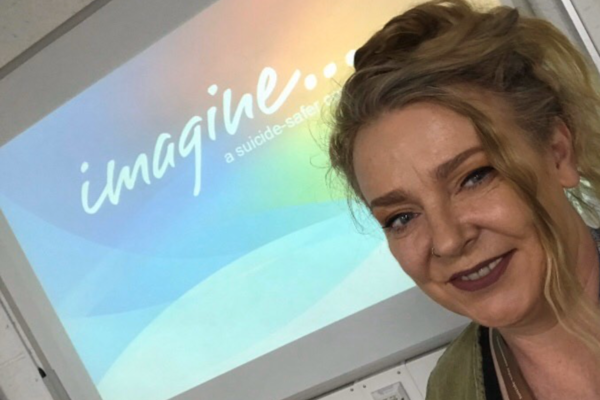Following Mental Health Awareness Week, many of us will be thinking about the impact of coronavirus on our and other’s mental health for perhaps the first time.
When we are dealing with a pandemic and lives are at risk, it is important that all methods of safeguarding are taken. This, for me, absolutely includes social distancing and all the other guidance that has been put in place. However, we must remember that mental ill health can also potentially be a risk to life and certainly suicidal thoughts can lead to behaviours, which in turn could cause death or a life with harm.
With a pandemic we know, historically, that infection and death rates occur in ‘waves’. We also know that with trauma, which I am seeing this period as being traumatic for the majority of the population, has phases or stages.
When we first began to hear about the virus, many of us believed it simply to be a form of influenza, which perhaps might be more severe. Perhaps we washed our hands more than usual, used hand sanitiser and kept our gloves on whilst using public transport. Then very quickly we noticed a shift, an underlying stress in society. People began to shake hands less, talk about the “killer virus” and, before we knew it, the UK was in lockdown.
Every day saw rising tables of infection and death. Every news channel was running interviews with images of patients in other countries, on trolleys in corridors, unable to receive treatment. We began to hear “protect the NHS” and understood the possibility that, if we or others caught the virus (unseen, silent), then we might not have the lifesaving facilities at our disposal that we always believed we had. We heard about the years of cuts leaving hospitals and the care sector leaving them without enough PPE or ventilators. Suddenly, we were pushed into fear.
When we perceive a threat, especially a life threatening one, stress reactions increase. This has physical symptoms, as well as psychological, behavioural and emotional ones. Perhaps your sleep was disturbed, your appetite changed, or your body was in a state of hyper vigilance - was that tickle in our throat the beginnings of THE cough? Have I got a temperature? Have we got a thermometer? They’re sold out in Boots and on Amazon…
All the things we’ve learned over the years that help us when we feel anxious were suddenly either forgotten or taken away from us. Maybe the way you deal with stress is by spending time with friends or family – we cannot do that physically anymore. Yes, we have Zoom & Facetime, but nothing beats that face to face contact. Nothing heals many of us like being held and body language can be missed on a WhatsApp conversation. Perhaps time with nature helps? We can’t travel to the countryside. Exercise? All the sports centres are shut and did you see the price hike in second hand exercise equipment?
So, we had to do the best we could. We were suddenly asked to either put ourselves on the front line and be potentially at risk or stay at home. If we had a home. If we had a home which was safe. If we were living with people who we felt safe with, who we had healthy relationships with. Hopefully, we had a garden! and an oven. A car, access to a nearby store…money in our bank and a steady income.
Many of us did not have all those things. Many of us were made instantly redundant, many were living alone. Many were shielding and told to stay in their bedrooms and order our shopping online, which was quickly booked up for weeks in advance. Carers were left with no ability to buy food because so many people bought far more goods than they needed, because of fear. Facebook says there’s a shortage of toilet roll - I better buy six packs then…
All of this and more was, and still is, occurring. We’ve known for some time that mental ill health and suicide is a far larger issue than the data captures. We know that many people are, at any given time, dealing with a large amount of emotional distress, which may not meet the criteria for diagnosis (if the individual presents to services at all) but means someone is carrying pain. We know that all the aforementioned issues can add to that distress and very swiftly increase the risk of mental ill health and, for some people, suicide.
There will be some of us with a mental health diagnosis who were surprised by how COVID-19 didn’t exasperate our symptoms. There will also be many who felt they were mentally well and were shocked when very quickly, we were experiencing panic attacks or symptoms of depression, hopelessness, helplessness, and such.
It’s very difficult to generalise but having worked with the community for over thirty years and specialised in mental health and suicide, I feel we have to seriously consider that the next few months could well see an increase in people being in distress. That could have happened, be happening or happen in the future. That many people (including front
line staff) could present with symptoms of PTSD, generalised anxiety disorder, self-harm and possibly suicide. We certainly must be prepared for that; ensure we have services who are ready willing and able to support those people effectively. We have a responsibility, I believe, to ensure we have the equivalent number of “ventilators” to help those whose lives are potentially at risk of suicide.
Evidence shows us that people at risk of suicide do try to ask for help, perhaps not as directly as we’d like and need them to, but they do give us invitations that they are struggling. It is important that we always check out those signs, see what they mean. When someone says “I’ve had enough” we need to ask “what does that mean?” and perhaps after their response ask directly “sometimes, when people are experiencing the things you’ve told me, they’ve said they are thinking about suicide. Are you thinking about suicide?” and then listen, risk assess and signpost quickly and sensitively.
This matters now more than ever in my opinion. We need to try and encourage each other to be open about how we feel and to not “sit” on fear or depressive emotions at all. Every death to COVID is a death too many, every death by suicide is also one too many but I believe that suicide is a preventable death, which isn’t air borne and often begins with people feeling alone and not valued. Now more than ever, we as a society, should be being kind to each other and gentle with ourselves.
These times are scary! Having no income is horrible - we need help with that. Being in a home where violence occurs is dangerous - we need help with that. Feeling isolated for many of us is unnatural and we need to mitigate that as much as possible.
Statistics are showing a huge increase in calls to helplines such as Mind, Samaritans and this fills me with hope and gratitude. Those answering those calls are skilled, experienced, qualified and have always been needed. Certainly, talking and being signposted, if applicable, will make a huge positive difference and decrease the risk of crisis - I’m hopeful statutory and third sector services will be increased and that funding will be made made available to meet the demand which will undoubtably rise.
Encouraging each other to access the help we need, when we need it is the basis of our overall healing. Physically and mentally. This might also include us not doing some things, such as limiting the time we spend on social media, watching the news, etc. Following NHS guidelines is very important but watching news flash statistics (with dramatic background music) ebb and flow, might not be. Learning a new skill (the Five Ways to Wellbeing are really important right now) may be wonderful but we don’t all need to judge our handling of this situation by our bread baking abilities!
I genuinely believe that if our day needs to be in PJ’s on the sofa smashing through Netflix then that’s ok too. Perhaps not every hour of every day though. What we certainly need to do is recognise that anything which gets us through these times, which does not hurt us or others, is ok. Self-compassion, which many of us struggle with, is the foundation of our recovery.
All those little things, which seem meaningless much of the time, now is the time to shine a light on them. Now is a time to perhaps revaluate what, and how, our life looks like - what makes our soul sing? Maybe many of us will come through this happier and healthier than we were previously. Certainly, that could be our goal.
In a time where we feel little or no control, we need to find some. In a time where we feel alone, we need to know that we are, in many ways, more united now than we ever have been.
We matter. You matter.


